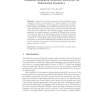Free Online Productivity Tools
i2Speak
i2Symbol
i2OCR
iTex2Img
iWeb2Print
iWeb2Shot
i2Type
iPdf2Split
iPdf2Merge
i2Bopomofo
i2Arabic
i2Style
i2Image
i2PDF
iLatex2Rtf
Sci2ools
159
click to vote
AGI
2011
2011
Nonlinear-Dynamical Attention Allocation via Information Geometry
Inspired by a broader perspective viewing intelligent system dynamics in terms of the geometry of “cognitive spaces,” we conduct a preliminary investigation of the application of information-geometry based learning to ECAN (Economic Attention Networks), the component of the integrative OpenCog AGI system concerned with attention allocation and credit assignment. We generalize Amari’s “natural gradient” algorithm for network learning to encompass ECAN and other recurrent networks, and apply it to small example cases of ECAN, demonstrating a dramatic improvement in the effectiveness of attention allocation compared to prior (Hebbian learning like) ECAN methods. Scaling up the method to deal with realistically-sized ECAN networks as used in OpenCog remains for the future, but should be achievable using sparse matrix methods on GPUs.
AGI 2011 | Artificial Intelligence | Gradient Algorithm | Information Geometry | Sparse Matrix Methods |
| Added | 24 Aug 2011 |
| Updated | 24 Aug 2011 |
| Type | Journal |
| Year | 2011 |
| Where | AGI |
| Authors | Matthew Iklé, Ben Goertzel |
Comments (0)

